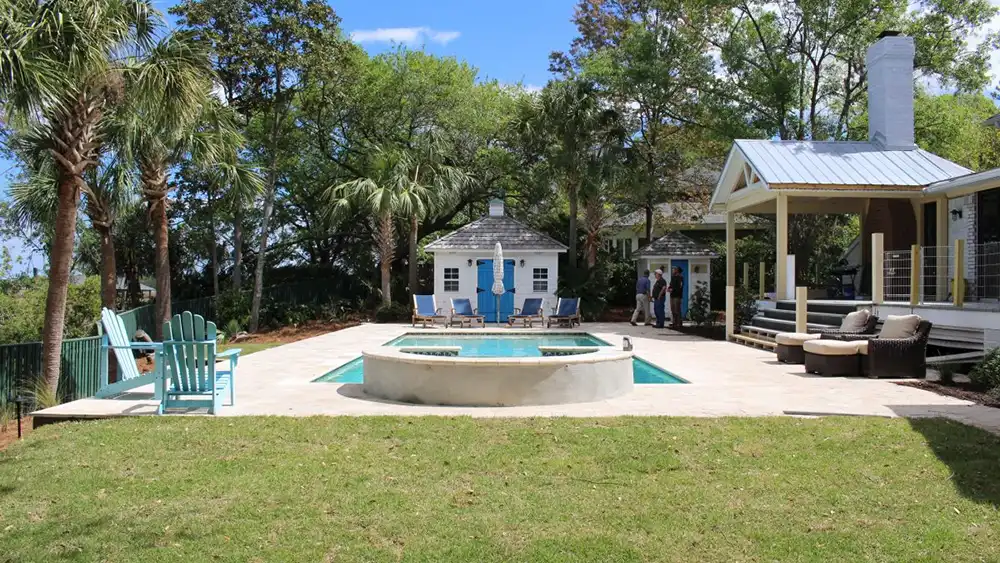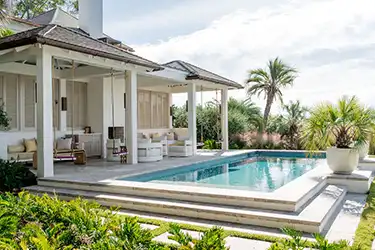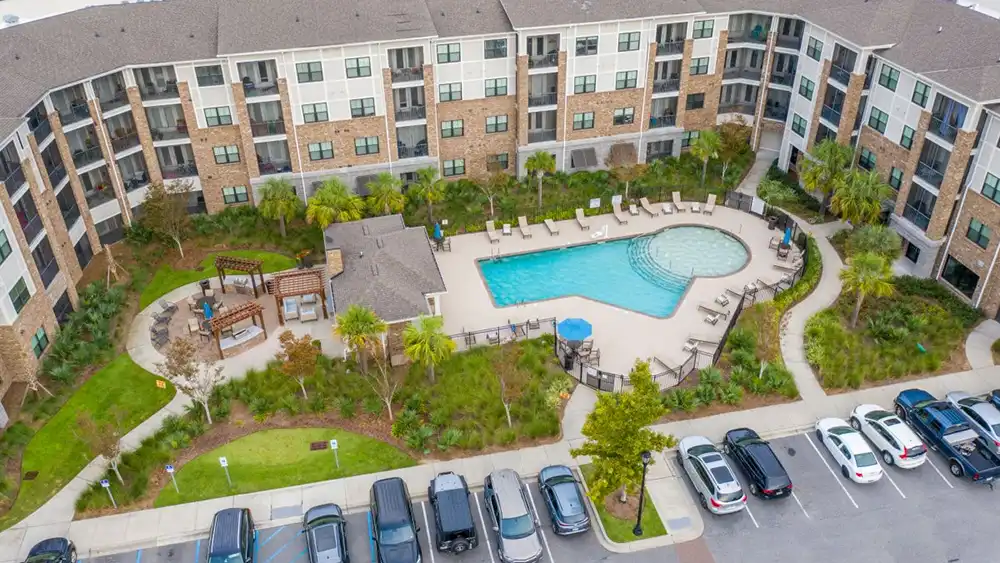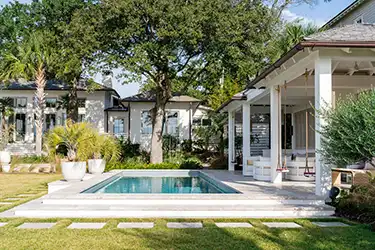
If you’re thinking of adding a pool to enhance your home’s beauty and charm and neighborhood hipness, area experts recommend that you start with a professional – so that the kind of beautiful, relaxing home pool you’re envisioning now can be ready to enjoy by early next year.

“A pool can add joy and beauty to your home but it doesn’t happen overnight or even within a few months,” said Andrea Futeral, marketing coordinator with Aqua Blue Pools of Charleston. “And it’s important to know what is required in order to get the pool you’ve always wanted.”
The first thing is to discuss your idea with a pool builder or contractor who can walk you through the necessary steps for design and construction.
Then, before any digging can occur, you and the pool-design builder will have to address several preliminary requirements, which include:
Topographic Survey
This document determines existing placements on your property, such as a footprint of the house, trees, driveways and easements. It will help your designer determine the best place on your property to locate the pool and all associated equipment.
Pool-Building Permit
While your contractor will help you obtain any necessary installation permits, your pool design will have to meet all codes and requirements per your property, especially if it is in any kind of flood zone.
For instance, when designing and building a pool in a V-Zone (Velocity Zone), structural engineers are required to be part of the front-end design process and in some cases soil engineers, who run tests on the soil to determine the strength or bearing capacity of the soil.
In other cases, either timber or helical piles are required. Deep piles may be required depending on the ground strength, even for some in-ground pools, depending on the soil quality. And if the pool is elevated above a certain criteria, then the BFE, or base flood elevation, will need to be factored into the planning process.
“The needs and requirements for each individual property will differ and will be taken into consideration by your pool contractor,” Futeral said.
Pool Designs
Pools can be designed in a variety of shapes and sizes, such as rectangular, curvilinear, geometric, freeform or others. They can be in-ground, elevated or partially elevated. And the property survey, along with your needs and desires, will help your pool designer determine what will work best for your goals and property.
“Regardless of what style you can choose, we build only concrete pools,” Futeral said. “Total construction could take approximately 12 weeks plus, but for an elevated pool, it takes longer.”
Lot Coverage Allowance
Unlike Fred and Barney, who simply built a pool to their liking, Futeral pointed out that Lowcountry pools can occupy only a certain amount of home property, depending on the location.
Mount Pleasant, for example, allows for a range of 30-50 percent for all lot coverage, which includes other structures, such as a pool. Your pool designer will help you determine the size of the pool and decking that is permitted on your property.
“We’ve had to turn away clients until they got the extra coverage for a pool by demolishing an existing property covering, such as a driveway,” she said. “That’s happened with us on more than a few occasions.”

Landscaping/Assessing Property Access
Mount Pleasant contractor Adam Dukes doesn’t build pools. But he and his Grandscapes team of landscaping professionals often work with pool builders throughout the greater Charleston area to see that all necessary surroundings fit the design and enhance the pool.
Dukes said one item that tends to get overlooked by owners is property access for landscaping equipment.
“Property access can affect whether or not things run smoothly once pool construction begins,” said Dukes, who founded Grandscapes in 2009. “Because if a pool’s placement shuts off all access to the back yard, it makes it more difficult for us to go in with our machines to do the landscaping.”

He added that being able to work alongside pool builders makes for a smoother operation and a better outcome for design items that accent the pool.
“We do a lot of hardscapes installation – patios, tree planting, irrigation, driveways, etc.,” Dukes said. “We operate year-round, but I encourage people wanting a pool with a landscaping design to begin planning for it as soon as possible because this allows us time to work with the pool company in planning timelines and obtaining official permits.”
Fast vs. Efficient
While it can feel exciting to want a pool now, Futeral pointed out that a custom pool is an investment.
“Cutting corners may save time upfront – but it could cost you so much more when easily-avoidable issues later arise,” she said.
Issues resulting from a job done too fast include:
Compromised Structural Integrity: This can result in issues such as leaks, cracks and uneven settling over time.
Subpar Materials: Using subpar materials may initially lower costs but can lead to the financial burdens of repairs and replacements down the line.
Lack of Attention to Detail: Building a custom pool requires careful planning and execution. Speeding through the procedure can result in oversights and mistakes that detract from the overall quality and aesthetics of the finished product.
Limited Customization Options: Fast building may also limit your options for customization, as builders prioritize speed over design flexibility. This can result in a cookie-cutter pool that fails to reflect your unique vision and preferences.
“Ensuring you get the job done is not enough,” Futeral said. “It is imperative you get the job done correctly,” she said.
Furnishings
By the design stage, you’ll probably be giving thought to pool furnishings such as tables, chairs, umbrellas, inner tubes, inflatable pool floats and toys, with visions of playing your first game of Marco Polo.
But other items you might not think of in the beginning that are just as critical include automated electrical and lighting systems, pool safety covers, water filtration and circulation and ongoing professional maintenance.
And while all this can sound like considerable effort just to install a new pool, Dukes and Futeral both said the alternative is a lot of wasted time and a job that could eventually result in unnecessary headaches and extra costs.
“Prep work can make a pool project move twice as fast and make it more cost effective as well,” Dukes said.
Planning ahead might even help you keep a next-door neighbor friendship intact without unnecessary hassle.
“It might seem like a lot of front-end work, but it is really worth it in the end,” Futeral said. “You’ll be so much happier with how the pool looks and how you want to use it – and you’ll be able to create a lot of happy memories and enjoy the pool for a long, long time.”
By L. C. Leach III

Leave a Reply